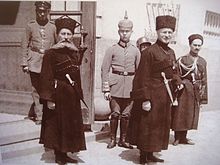German-Ukrainian relations

|
|
|
|
|
| Germany | Ukraine |
German-Ukrainian relations are the political, economic, cultural and personal relationships between Germany and Ukraine and their people.
Germany has an embassy in Kiev , a consulate general in Dnipro and an honorary consulate each in Kharkiv , Lviv and Odessa . Ukraine has an embassy in Berlin and four consulates general in Düsseldorf , Frankfurt am Main , Hamburg and Munich, as well as an honorary consulate in Mainz .
In 2014 around 130,000 Ukrainians lived in Germany and in 2001 around 33,000 Germans lived in Ukraine .
history
middle Ages
In 959, Princess Olga of Kiev asked Emperor Otto the Great for a bishop to Christianize the Kievan Rus . The sent monk Adalbert returned to Magdeburg in 862 without success.
In the 11th century there were marriages between Grand Duke Swjatoslaw II and Oda von Babenberg and Prince Jaropolk with Kunigunde von Weimar-Orlamünde . German merchants were mentioned in Old Russian chronicles in Kiev , Wolodymyr-Wolynskyj and Lutsk .
18th and 19th centuries

The Russian empresses Elisabeth and Catherine the Great brought German settlers to the Ukrainian areas of the Russian Empire in the 18th century. The Austrian Empress Maria Theresa settled Germans in Galicia at the end of the 18th century ( Galicia Germans ).
In the 19th century, numerous German colonists came to Wolhynia ( Wolhyniendeutsche ), the Black Sea ( Black Sea Germans ), Bessarabia and the Crimea . They mostly settled as farmers and craftsmen. The colony Askanija-Nowa ( Askania Nova ) on the Black Sea was one of the largest German settlements. German Mennonite religious refugees also came to Ukraine.
First World War

In 1914, after the beginning of the First World War, most of the Russian Ukrainians in Russia were deported to Siberia , others emigrated.
In February 1918 , German troops occupied a large part of Ukraine after the Brest-Litovsk peace treaty . From April to December 1918 they established a hetmanate Ukraine with Pavlo Skoropadskyj as the hetman .
Second World War
From the end of 1941, the German Wehrmacht conquered a large part of the Ukrainian Soviet Socialist Republic and established the Reich Commissariat for Ukraine and the District of Galicia . The Organization of Ukrainian Nationalists and its military wing, the Ukrainian Insurgent Army with the goal of an independent Ukraine, initially welcomed German aid in the fight against Soviet Russia . However, relations later deteriorated and fighting took place between the Wehrmacht and the Ukrainian nationalists.
Around 5 to 7 million Ukrainians and one to two million Jews were killed in Ukraine.
GDR and Ukrainian SSR
Since 1945 many Ukrainian soldiers were stationed in the Soviet army in the Soviet occupation zone and the GDR . However, there was hardly any contact with the German population.
There was intensive cooperation in economic, scientific and cultural areas between the GDR and the Ukrainian SSR. There were town twinning .
Federal Republic of Germany and Ukrainian SSR
From 1944 to 1950, many surviving OUN leaders and displaced Ukrainians found refuge in the American zone of occupation in Germany. The Ukrainian Free University moved in 1945 its headquarters from Prague to Munich . Radio Free Europe from Munich has also broadcast in Ukrainian since the 1950s .
In 1957 Lev Rebet and 1959 Stepan Bandera were murdered in Munich by the Soviet agent Bogdan Nikolajewitsch Staschinski ( Staschinski case ).
Federal Republic of Germany and Ukraine
Most Ukrainian Germans moved to Germany since 1990. Since then, around 40,000 Germans have been living in Ukraine, including Kiev, Kharkiv and Odessa.
In 1989 the Federal Republic of Germany opened the first consulate general in Kiev, and in 1992 an embassy. In 1993 a Goethe Institute was opened in Kiev, and in 1998 an office of the German Academic Exchange Service . Since then, over 4,000 Ukrainian students have studied in Germany.
The political changes in Ukraine since 2004 have been supported by the German Federal Government and committed citizens and organizations.
Ukraine has a "primary priority" in the foreign policy of the Federal Republic of Germany .
Economic relationships
Over 1000 German companies are active in the Ukraine. For Ukraine, Germany is the second most important foreign trade partner.
literature
- Frank Grelka: The Ukrainian national movement under German occupation in 1918 and 1941/42 . Harrassowitz-Verlag 2005 ( pdf )
- Claus Remer: Ukraine in the focus of German interests. End of the 19th century until 1917/18 . Frankfurt am Main 1997.
- Gans-Joachim Torke, John-Paul Himka (Ed.): German-Ukrainian Relations in Historical Perspective . Edmonton & Toronto, 1994
See also
- Bessarabian Germans
- Bukowina Germans
- Galician Germans
- Crimean Germans
- Black Sea Germans
- Wolhynian Germans
- Ukrainian Germans
- List of German-Ukrainian city partnerships
- Embassy of Ukraine (Remagen)
- List of German ambassadors in Ukraine
Individual evidence
- ↑ List of diplomatic missions from both countries , accessed on November 14, 2017
- ↑ 2001 population statistics of Ukraine , accessed on July 21, 2013
Web links
- German settlers: the rise and fall between the Carpathian Mountains and the Black Sea Trident journeys
- The Foreign Office on bilateral relations with Ukraine
- German Embassy in Kiev (German and Ukrainian)
- Ukrainian Embassy in Berlin (German and Ukrainian)
- German settlers of the Ukraine Federal Government Commissioner for issues relating to repatriates and national minorities
- German-Ukrainian Forum eV
- Statistics: Ukrainian diaspora in Germany, bpb
- Meet Up! Funding for German-Ukrainian youth exchange
